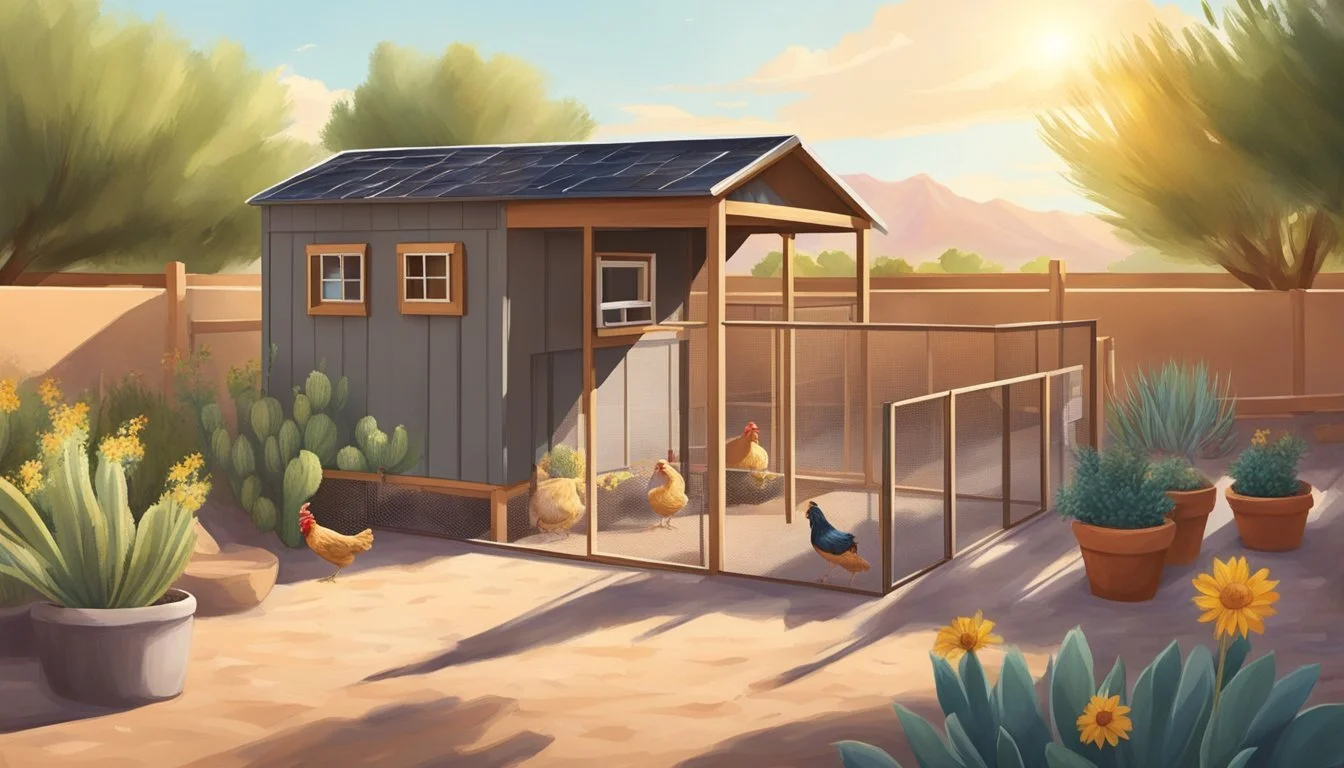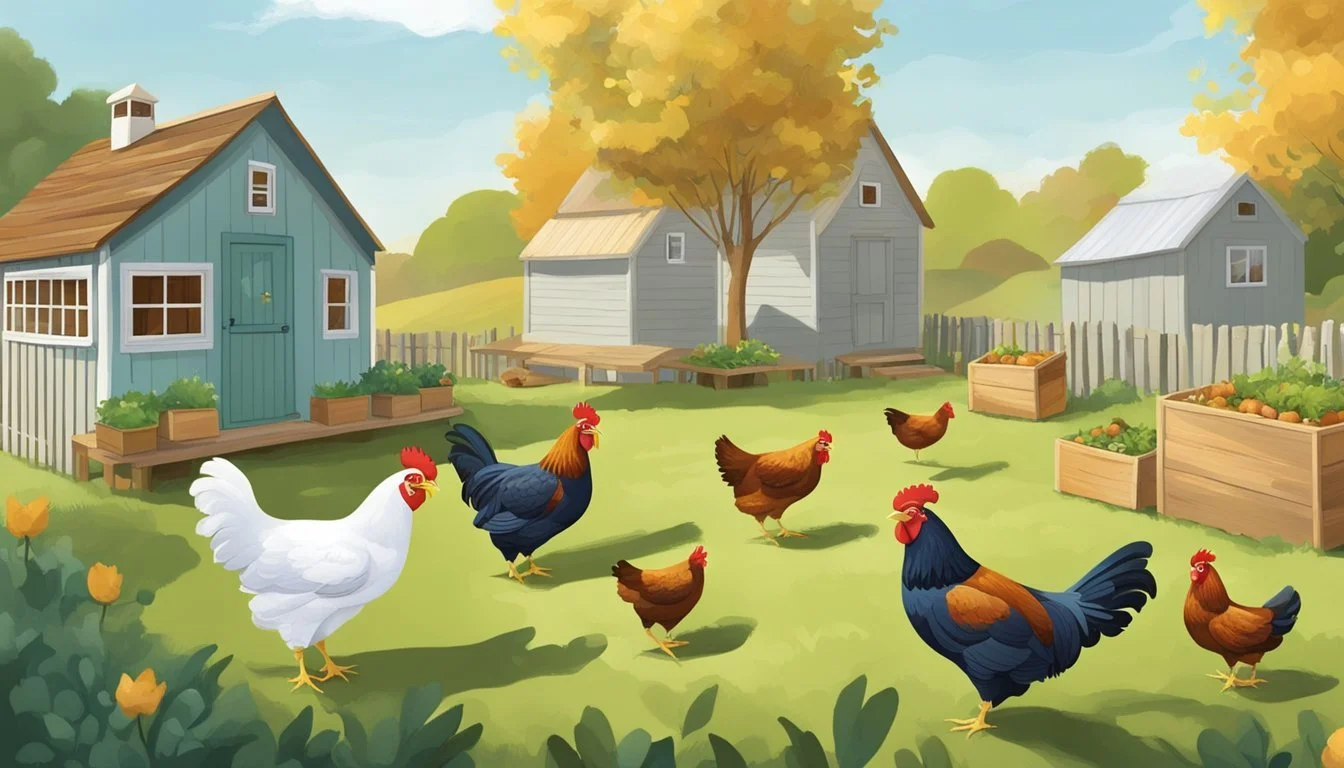Keeping Backyard Chickens in Mesa, AZ
Essential Tips for a Thriving Flock
Keeping backyard chickens (how long does chicken last?) provides several benefits, including fresh eggs, natural pest control, and the joys of animal companionship. Residents of Mesa, Arizona interested in maintaining a flock in their backyards will find a set of city-specific regulations designed to balance urban agriculture with community standards. These rules ensure both the wellbeing of the chickens and that of the neighborhood, setting standards for space, location, and the number of animals permitted.
In Mesa, the city ordinances accommodate the growing interest in urban homesteading while addressing concerns such as noise, smells, and potential health issues. Property zoning plays a crucial role in determining whether residents can keep chickens. Generally, the keeping of backyard chickens is allowed in residential zones, but homeowners must adhere to lot size requirements and restrictions on the proximity of chicken enclosures to neighboring residences.
The city has established clear guidelines regarding the number of chickens and the space necessary to raise them. Smaller lots can host a limited number of fowl, and larger acreages have the capacity for more, with the city employing a point system to govern the allowances. Homeowners in Mesa who wish to undertake backyard chicken keeping are encouraged to familiarize themselves with the local regulations to ensure they comply and can enjoy their hobby without disruptions.
Understanding Local Ordinances and Regulations
Keeping backyard chickens in Mesa, Arizona requires understanding and adhering to the specific local ordinances and regulations that govern the practice.
Mesa City Code and Chicken Ordinance
Mesa City Code 8-6-21 details the requirements for keeping livestock and fowl. For backyard chickens, the city of Mesa allows them under certain conditions. The number of chickens and other fowl permitted is determined by lot size and the point system specified in the code.
Permits and Zoning Issues
Zoning is crucial when determining if chickens are allowed on a property. Residential zones generally permit backyard chickens, but homeowners must ensure they comply with any specific zoning rules that may affect their property. In some instances, a permit may be required to keep chickens within city limits.
Limits on Chickens and Roosters Allowed
There are limits to the number of fowl one can keep. On lots less than ½ acre (21,780 sq ft), no more than a total of 10 fowl, including chickens and rabbits, are allowed. It is important to note that roosters might be subject to additional regulations or may not be allowed due to noise ordinances.
Proximity to Neighboring Residence
One major zoning problem regarding the keeping of chickens in Mesa relates to their proximity to neighbors. Enclosures must be placed at least 40 feet from any neighboring residence. Moreover, any chicken coop must be situated at least 75 feet away from any other residence, ensuring minimal disturbance to surrounding neighbors.
Choosing the Right Chicken Breed
In selecting the ideal chicken breed for backyard flocks in Mesa, Arizona, owners must account for the region's hot climate and consider each breed's purpose and temperament.
Considering Climate and Temperament
In Mesa's warm conditions, breeds like the Naked Neck and Australorp thrive due to their heat tolerance. When considering temperament, breeds such as the docile Australorp may be preferred for their calm nature and adaptability to confinement, which is ideal for backyard settings.
Egg Layers vs Meat Breeds
Owners must decide whether their priority is egg production, meat, or both:
Egg layers: The Rhode Island Red is renowned for its prolific egg-laying capacity, making it an ideal choice for owners prioritizing egg production.
Meat breeds: Breeds such as the Jersey Giant offer substantial meat yield due to their larger size.
Popular Breeds in Arizona
Some chicken breeds are more popular in Arizona due to their adaptability and productivity:
Rhode Island Reds: They are favored for their robustness and high egg yield.
Australorps: Black Australorps are considered among the best choices for beginners due to their dual-purpose nature and significant egg-laying capability.
Choosing the most suitable breed involves a balance of climate adaptability, purpose, and temperament, ensuring a thriving backyard flock in Mesa, Arizona.
Setting Up Your Chicken Coop
When setting up a chicken coop in Mesa, AZ, it’s crucial to focus on the design and security of the structure, protection from local predators, and adequate ventilation to maintain a healthy environment for the chickens.
Coop Design and Security
The coop should serve as secure housing for chickens, constructed to withstand local weather conditions. It is recommended to build the coop with a solid foundation and use sturdy materials that deter rodents and other small pests. The use of chicken wire around the enclosure ensures that the chickens have an area to roam while keeping them contained.
Protection from Predators
Backyard chickens in Mesa are at risk from predators such as coyotes, dogs, and hawks. To protect them, one should fortify the coop with hardware cloth instead of chicken wire, as it is more durable and provides better defense. Securing all possible entry points and adding a wire mesh overhead can help mitigate the risk of aerial and ground predators.
Ensuring Proper Ventilation
Proper ventilation is essential for the health and well-being of backyard chickens. Integrating vents or windows with predator-proof screens can facilitate airflow. In the hot Mesa climate, the use of a fan can help circulate air, but care should be taken to ensure that the chickens are not in direct line of the airflow to prevent drafts.
Maintaining Health and Sanitation
When keeping backyard chickens in Mesa, AZ, it is essential to prioritize the health and hygiene of the poultry environment. This involves adhering to stringent cleaning routines, controlling potential nuisances such as noise and odor, and implementing measures to prevent diseases.
Cleaning Best Practices
Daily Maintenance: At a minimum, waterers and feeders should be checked and cleaned daily to prevent the buildup of dirt and waste, ensuring chickens have access to fresh water and food.
Weekly Cleaning: Coops should be thoroughly cleaned on a weekly basis, including removing old bedding and replacing it with fresh material. All surfaces should be scrubbed to prevent the accumulation of droppings and other waste.
Controlling Noise and Odor Nuisance
Odor Control: Regular cleaning of the coop and surrounding area is necessary to prevent offensive odors. The use of materials such as straw or wood shavings can absorb moisture and minimize smell.
Noise Management: Chickens must be kept in a manner that limits excessive noise, especially during early morning and late evening hours, to maintain good relations with neighbors.
Disease Prevention
Quarantine New Birds: New additions to the flock should be quarantined for at least 30 days before introduction to prevent the spread of disease.
Vaccination and Health Checks: Regular veterinary care, including vaccinations and check-ups, plays a crucial role in maintaining the health of the chickens and mitigating the risk of disease outbreak.
Chicken Care Essentials
Keeping backyard chickens healthy in Mesa, AZ requires attention to their dietary needs, consistent water supply, and proper handling of the eggs they produce.
Feeding and Nutrition
Chickens need a balanced diet to maintain their health and ensure robust egg production. Feed stores in Mesa provide a variety of nutritionally complete feeds suitable for different stages of a chicken's life. Starter feeds for chicks are high in protein, while layer feeds contain added calcium to support eggshell quality. Owners should provide a mix of grains, seeds, and pellets to ensure a well-rounded diet. Supplemental foods like vegetables can be offered in moderation, but the core of a chicken's diet should be a quality commercial feed.
Water Supply and Management
A reliable water source is vital for chickens to stay hydrated, especially during the hot Arizona summers. Clean, fresh water should be available at all times, with containers cleaned regularly to prevent algae and bacteria growth. In extreme heat, water supply should be monitored closely as chickens will consume more to regulate their body temperature. Automated watering systems can help maintain a consistent supply and reduce the labor of refilling containers.
Laying and Egg Handling
Proper facilities help ensure consistent laying and safeguard fresh eggs. Each chicken requires access to a nest box, lined with straw or shavings, which should be kept clean to prevent contamination. Eggs should be collected at least once a day to avoid breakage or being soiled. After collecting, eggs can be gently cleaned with water and stored at a consistent temperature to maintain freshness. Regularly checking nest boxes throughout the day can increase egg quality and decrease the chance of the chickens developing undesirable behaviors like egg eating.
Community Interaction and Resources
Keeping backyard chickens in Mesa, AZ, is more than just tending to your flock; it involves engaging with the community and harnessing various resources to ensure a successful and compliant chicken-keeping experience.
Engaging with Local Chicken Keepers
One of the best ways to integrate into the local chicken-keeping scene is to connect with neighbors who also raise chickens. They offer a wealth of real-world advice and can share experiences specific to Mesa's climate and regulations. Networking with others can be invaluable for beginners and experienced keepers alike. Often, feed stores in Mesa act as hubs for local keepers to find each other and exchange tips.
Learning from Online Resources
The internet is a treasure trove of information, with sites like backyardchickens.com providing a platform for chicken enthusiasts to discuss and learn about different aspects of chicken keeping. It is important to consider Arizona chicken ordinances while collecting information, as these can vary between Mesa, Phoenix, Tempe, Tucson, and Scottsdale. Online forums can help clarify these regulations and offer guidance.
Online Communities and Forums:
Arizona-based Groups: Seek out Arizona-specific chicken-keeping groups where you can learn from the experiences of individuals in similar climates and legal jurisdictions.
BackyardChickens.com: Connect with a large and active community that discusses various topics from coop construction to chicken health.
Local Ordinances and Legal Advice:
Municipal Websites: Always verify information with Mesa's official website or local government offices to ensure compliance with local ordinances.
Legal Forums: Legal advice forums may help you understand backyard chicken laws in detail.
Remember, the key to successful backyard chicken keeping in Mesa, AZ, is to use a combination of community engagement and reliable online resources. This approach will help maintain healthy flocks and uphold community standards.







